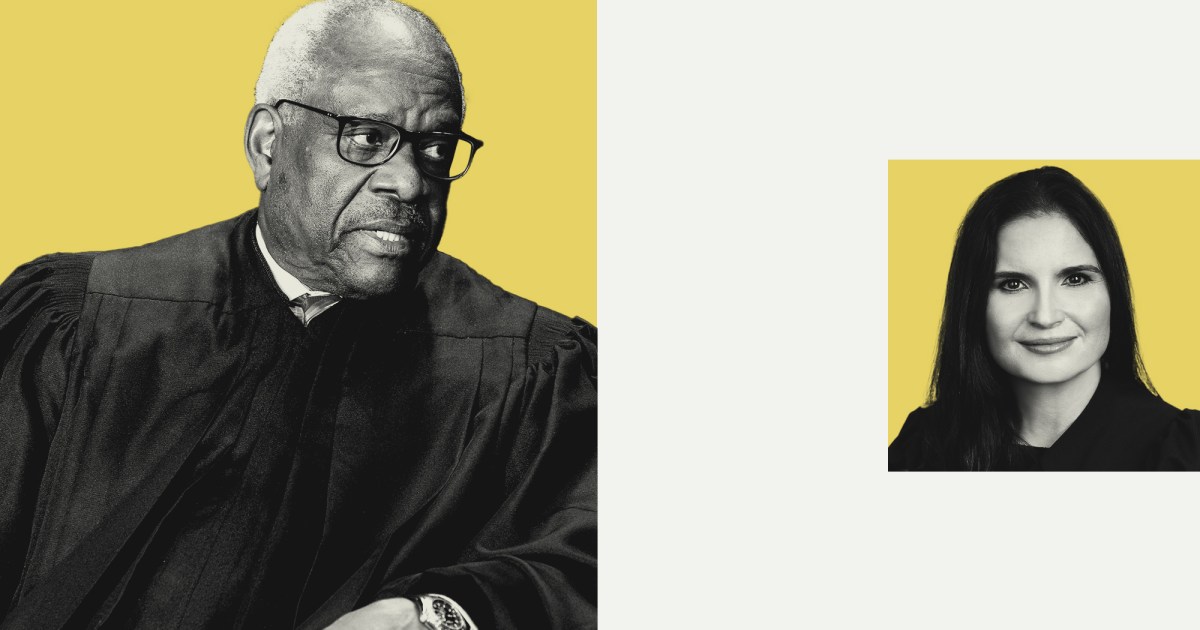Mom Jones; Eric Lee/Pool//CNP/ZUMA; Southern District of Florida
Two weeks in the past, the Supreme Court docket introduced that former presidents are immune from prosecution for presumably all official acts undertaken whereas in workplace. This new rule, the bulk mentioned, was vital to preserving the separation of powers in our democracy. Justice Clarence Thomas, characteristically, went additional. The true menace to democracy was not an unaccountable president however, somewhat, the very existence of the particular prosecutor who was main the case.
In a concurrence, Thomas questioned whether or not the lawyer basic had the authority to nominate Jack Smith, the particular counsel who was prosecuting Trump. “We should respect the Structure’s separation of powers in all its kinds, else we danger rendering its safety of liberty a parchment assure,” Thomas wrote. He referred to as on federal judges to find out whether or not Legal professional Common Merrick Garland, himself the previous chief choose on the DC Circuit Court docket of Appeals, had made the appointment illegally. “The decrease courts ought to thus reply these important questions in regards to the Particular Counsel’s appointment earlier than continuing,” Thomas urged.
Immediately, Decide Aileen Cannon answered that decision. In a stunning opinion, Cannon threw out Smith’s separate case in opposition to Trump for allegedly hiding labeled paperwork at Mar-a-Lago and trying to thwart an investigation into the matter. Smith, Cannon concluded, was not appointed or funded in response to the principles specified by the Structure.
Cannon, a Trump appointee in Florida, started considering this query earlier than Thomas’ concurrence within the immunity case. Trump’s authorized group had filed its movement asking for the paperwork case to be dismissed on these grounds on February 22, and Cannon held a listening to on the query on June 21. As a part of that listening to, she invited attorneys who had filed amicus briefs on the subject to argue earlier than her. The listening to lasted 4 hours. Every week later, the Supreme Court docket handed down the immunity case, and Thomas exhorted decrease court docket judges to look into the legality of Smith’s appointment. Thomas’ invitation got here simply in time for Cannon to take it up, and she or he cited the Thomas concurrence thrice.
Cannon’s choice is gorgeous partly as a result of it upends the apparently settled understanding of the powers of the lawyer basic because the creation of the Justice Division in 1870. The Supreme Court docket affirmed the constitutionality of a particular counsel in United States v. Nixon. And when the appointment of Robert Mueller as particular counsel for the Trump-Russia investigation was challenged, the district court docket and the DC Circuit Court docket of Appeals left Mueller in place. That was 5 years in the past.
Cannon’s choice is prone to be appealed to—and fairly presumably overturned by—the eleventh Circuit, the place Republican-appointed appellate judges have ceaselessly refused to adjust to Trump’s needs. However there’s an plain development of Thomas’ outlier opinions ultimately turning into the regulation of the land, particularly now that conservatives have a 6-3 majority on the Supreme Court docket. His invitation to seek out Smith’s appointment illegal, regardless of precedent and a protracted historical past on the contrary, might in the end win the day.
Each Thomas and Cannon body the particular counsel appointment as a violation of the separation of powers—the manager department snatching energy from Congress as a result of, they argue, Congress didn’t explicitly create the particular counsel place. This framing dramatizes what’s in the end a statutory interpretation case. Do the legal guidelines that give the lawyer basic the ability to nominate particular counsels achieve this explicitly sufficient? Nobody has mentioned the Structure forbids such a place to exist, they solely problem whether or not Congress has given the lawyer basic that permission to fill it and fund it.
Cannon ends her opinion by asserting that the manager department has been, by way of greater than 150 years of such appointments, upsetting the steadiness of powers between the three branches. “The accretion of harmful energy doesn’t
are available a day,” Cannon wrote close to the tip of her prolonged opinion, quoting from former Justice Felix Frankfurter. “It does come, nevertheless slowly, from the generative drive of unchecked disregard of the restrictions that fence in even essentially the most disinterested assertion of authority.” Lastly, Cannon implies, she is placing a cease to such lawlessness.
If there’s one factor the present Supreme Court docket does, it’s overturn longstanding precedents and beforehand settled understandings of the regulation. It overturned Roe v. Wade, threw out a long time of precedents upholding affirmative motion, upended doubtlessly hundreds of rules by jettisoning Chevron Deference, and remade the presidency into an workplace largely unconstrained by legal regulation. It will be stunning if the court docket determined that particular counsel appointments have been illegal—however at this level it will not be out of character.
